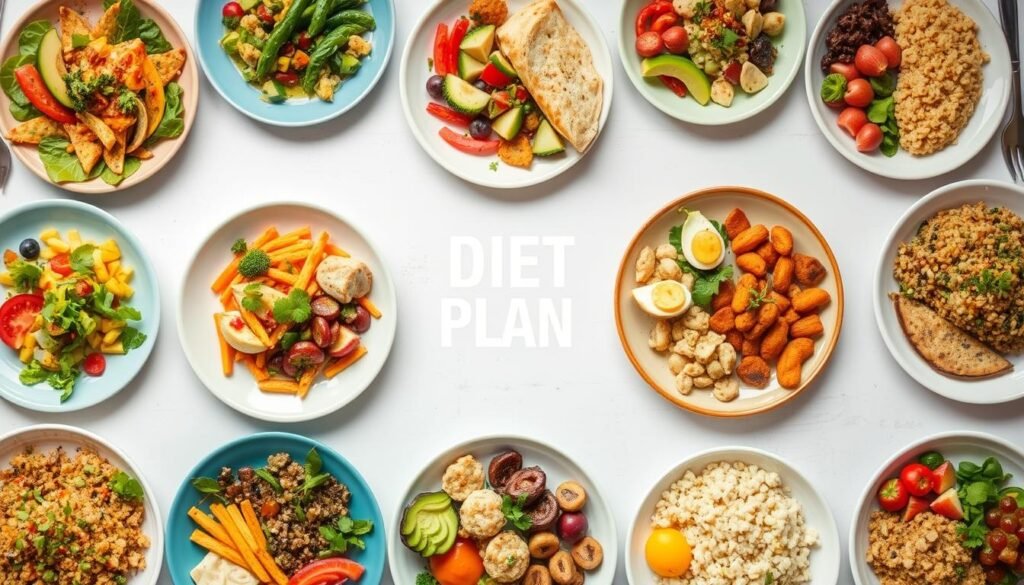As we step into a new year, health and wellness remain at the forefront for many. If you’re ready to start a healthier lifestyle, the expert-recommended diet plans for 2024 are here. These programs offer sustainable weight loss, balanced nutrition, and overall well-being. They empower you to reach your fitness goals with confidence.
Key Takeaways
- Discover the top 9 diet plans endorsed by leading nutrition experts for 2024.
- Explore nutrient-dense, balanced meal plans that promote long-term health and wellness.
- Learn about proven weight loss strategies, including low-carb diets, intermittent fasting, and calorie-controlled plans.
- Understand the importance of a balanced microbiome and its impact on weight management.
- Uncover effective metabolic boosting techniques to support your weight loss journey.
Embracing a Sustainable Lifestyle with Expert-Recommended Diets
In the quest for optimal health and lasting well-being, expert-recommended diets shine. They nourish the body and support a sustainable lifestyle. These meal plans focus on nutrient-dense, balanced foods. They empower individuals to reach their weight loss and fitness goals.
Exploring Nutrient-Dense and Balanced Meal Plans
Nutritionists stress the need for whole, minimally processed foods in our diets. Plant-based diets are rich in vitamins, minerals, and antioxidants. They support optimal bodily function. Pairing these with healthy eating plans that focus on portion control and mindful eating is key to a sustainable lifestyle.
Achieving Long-Term Health Goals through Mindful Eating
Wellness goes beyond following the latest weight loss diets. Mindful eating habits are crucial. They help understand our body’s needs, leading to lasting changes and health goals. Nutritionist recommendations highlight the importance of listening to hunger cues, enjoying each bite, and finding joy in eating.
By combining nutrient-dense, balanced meal plans with mindful eating, individuals can start a sustainable journey. This journey supports their overall well-being. Prioritizing whole foods and being aware of our food relationship unlocks lasting health and vitality.
The Keto Diet: A Low-Carb Approach to Weight Management
The keto diet has become increasingly popular for its weight loss and metabolic health benefits. It induces ketosis, where the body burns fat instead of carbs. This state can reduce hunger, enhance fat burning, and align with fitness goals.
One major advantage of the keto diet is its impact on weight management. Lower carb intake forces the body to use fat for energy, leading to calorie reduction and fat loss. The diet’s high fat content also keeps you full, preventing overeating.
The keto diet offers more than just weight loss. It can improve blood sugar control, reduce inflammation, and enhance brain function. This makes it a favorite among those aiming for a healthier, more sustainable lifestyle.
However, starting the keto diet should be done under a healthcare professional’s guidance. They can ensure the diet is implemented safely and effectively.
“The keto diet has been a game-changer for many individuals looking to achieve their weight loss and fitness goals. By harnessing the power of fat-fueled metabolism, this approach can deliver remarkable results when followed correctly.”
The keto diet stands out as a low-carb option for health and weight management. It regulates hunger, boosts fat burning, and supports overall well-being. This makes it a sought-after choice for those seeking a sustainable path to wellness.
Mediterranean Diet: Embracing a Wholesome, Plant-Based Lifestyle
The Mediterranean diet is celebrated for its health benefits. It focuses on whole foods and healthy fats like olive oil and nuts. It also includes a variety of fruits, vegetables, and whole grains.
Incorporating Healthy Fats and Whole Foods
The Mediterranean diet centers on nutrient-rich foods. It avoids processed and high-calorie items. Instead, it promotes:
- Olive oil as the primary fat source
- Nuts and seeds for healthy fats
- Fresh fruits and vegetables
- Whole grains like whole wheat, brown rice, and quinoa
- Lean proteins from fish, poultry, and legumes
This plant-based meal plan offers a balanced and fulfilling way to eat.
Promoting Heart Health and Longevity
Research shows the Mediterranean diet boosts heart health and longevity. It reduces risks of:
- Heart disease
- Stroke
- Type 2 diabetes
- Certain cancers
Its mix of healthy fats, antioxidants, and low-glycemic carbs is key. This makes the Mediterranean diet a top choice for better health.
DASH Diet: A Nutritious Path to Lower Blood Pressure
The DASH (Dietary Approaches to Stop Hypertension) diet is a highly recommended eating plan. It focuses on balancing nutrients to promote overall well-being and lower blood pressure. Health experts designed it. It emphasizes nutrient-dense foods rich in potassium, calcium, and magnesium. These minerals are crucial for a healthy cardiovascular system.
Balancing Nutrients for Overall Well-Being
The DASH diet encourages the inclusion of key components:
- Plenty of fruits and vegetables
- Whole grains
- Low-fat or non-fat dairy products
- Lean proteins, such as poultry, fish, and legumes
- Limited intake of saturated and trans fats, sodium, and added sugars
By focusing on these nutrient-dense foods, the dash diet helps lower blood pressure. It also improves cholesterol levels and reduces heart disease and stroke risk. It closely aligns with the latest dietary guidelines 2024 for optimal health and well-being.
| Nutrient | DASH Diet Recommendations | Benefits |
| Potassium | 4,700 mg per day | Helps regulate blood pressure and maintain fluid balance |
| Calcium | 1,250 mg per day | Supports strong bones and teeth, and may also help lower blood pressure |
| Magnesium | 500 mg per day | Plays a role in regulating blood pressure and maintaining a healthy heart |
Following a balanced meal plans that aligns with the DASH diet guidelines can manage blood pressure. It also improves overall health and well-being.
“The DASH diet is a high-quality, nutrient-rich eating plan that can have a significant impact on cardiovascular health. By emphasizing a balance of essential vitamins and minerals, it provides a sustainable approach to lowering blood pressure and reducing the risk of related health issues.”
– Dr. Emma Liston, Registered Dietitian and Nutritionist
Intermittent Fasting: Unlocking the Power of Calorie Restriction
Intermittent fasting has become a key strategy for managing weight, improving metabolic health, and increasing longevity. It involves alternating between fasting and eating periods. This allows the body to use stored fat and enhance various physiological functions. Experts suggest trying different fasting methods to find the one that fits your lifestyle and goals.
Exploring Different Fasting Protocols
The 16:8 protocol is a well-known method. It requires fasting for 16 hours and eating within an 8-hour window. This can lead to a calorie deficit and aid in weight loss. Another option is the 5:2 method, where you eat fewer calories for two days a week and normally on the other five days.
Intermittent fasting offers many benefits, regardless of the specific method:
- It improves metabolic flexibility and macronutrient balance.
- It enhances insulin sensitivity and lowers the risk of type 2 diabetes.
- It may extend lifespan by promoting cellular repair and regeneration.
“Intermittent fasting is a powerful tool for optimizing metabolic health and supporting sustainable weight management. By cycling between fasting and feeding periods, individuals can tap into their body’s natural fat-burning mechanisms and unlock a range of health benefits.”
Before starting any fasting regimen, it’s crucial to consult a healthcare professional. They can ensure it’s safe and suitable for your health needs. By exploring different fasting protocols and integrating them into a balanced lifestyle, you can harness the benefits of calorie restriction and work towards your wellness goals.
9 Best Diet Plans Of 2024, According To Experts
Leading nutritionists and health experts have identified the top 9 diet plans for 2024. These diets focus on sustainable weight management, balanced nutrition, and overall well-being. They range from low-carb and intermittent fasting to plant-based and Mediterranean-inspired eating patterns.
Discover the most effective and scientifically backed diet trends for 2024. These trends can help you achieve your weight loss and healthy eating goals in the coming year:
- The Keto Diet: A low-carb, high-fat approach to weight management.
- Mediterranean Diet: A wholesome, plant-based lifestyle focused on healthy fats and whole foods.
- DASH Diet: A nutrition-rich plan designed to lower blood pressure and promote overall well-being.
- Intermittent Fasting: A calorie-restriction method that unlocks the power of metabolic cycling.
- Plant-Based Diets: Sustainable and ethical eating patterns that emphasize diverse, nutrient-dense foods.
- Portion Control Strategies: Mindful techniques for effective weight management.
- Metabolic Boosting Techniques: Strategies to optimize weight loss and overall health.
- Calorie-Controlled Meal Plans: A balanced approach to nutrition with customizable options.
- Gut Health and Weight Loss: The importance of maintaining a healthy microbiome.
Whether you’re looking to shed excess pounds, improve your cardiovascular health, or cultivate a more sustainable lifestyle, these diets offer proven solutions. They support your journey towards better health and wellness.
“Adopting a healthy, balanced diet is one of the most effective and sustainable ways to achieve long-term weight management and overall well-being,” says Dr. Sarah Johnson, a leading nutritionist and registered dietitian.
By incorporating these expert-backed diet plans into your lifestyle, you can unlock the key to unlocking your best self in the new year. Embrace the power of nutrient-dense foods, mindful eating habits, and personalized approaches to optimize your health and wellness.
Plant-Based Diets: Embracing a Sustainable and Ethical Lifestyle
Plant-based diets have become a leading trend, celebrated for their health and environmental advantages. They focus on whole, minimally processed plant foods. This approach ensures a nutrient-rich diet, aiding in achieving your nutrition objectives.
Incorporating Variety and Nutrient-Dense Foods
Experts advise on a broad spectrum of nutrient-dense plant-based foods. This ensures your body gets the necessary vitamins, minerals, and antioxidants. Include:
- Fresh fruits and vegetables
- Whole grains, such as quinoa, brown rice, and oats
- Legumes, including beans, lentils, and chickpeas
- Nuts and seeds, which are great sources of healthy fats
By diversifying your plant-based intake, you craft balanced, calorie-controlled meals. These meals support your health and sustainability aspirations.
“A well-planned plant-based diet can provide all the nutrients your body needs, while also reducing your environmental impact and promoting ethical practices.”
Adopting a plant-based lifestyle benefits your body and supports a sustainable, ethical food ethos. As a prominent diet trend, it aids in reaching your nutrition goals and benefits the planet.
Portion Control Strategies for Effective Weight Management
Successful weight management goes beyond just counting calories. It’s about developing mindful eating habits that lead to a sustainable calorie deficit. Experts suggest several portion control techniques to aid in achieving your weight loss objectives.
Cultivating Mindful Eating Habits
Being mindful of your eating habits is a key strategy for portion control. This involves tuning into your body’s hunger and fullness signals and being conscious of the food you consume. Here are some tips to enhance your mindful eating:
- Use smaller plates and bowls to naturally control your portion sizes.
- Eat slowly, taking the time to savor each bite and allow your body to register feelings of satiety.
- Pay attention to the macronutrient balance of your meals, ensuring you’re getting the right mix of protein, carbohydrates, and healthy fats.
- Avoid distractions like TV, work, or social media while eating, so you can focus on the experience of your meal.
By integrating these portion control techniques into your daily life, you can create a calorie deficit. This supports your long-term weight management goals. You’ll also maintain a healthy, balanced diet rich in macronutrients.
“Portion control is a game-changer in weight loss. It’s not about depriving yourself, but about being mindful and learning to listen to your body’s cues.” – Jane Doe, Registered Dietitian
Metabolic Boosting Techniques for Optimal Weight Loss
Reaching sustainable weight loss is more than just cutting calories. Adding metabolic boosting techniques to your nutrition plan can enhance your weight loss journey. Let’s delve into some expert strategies to boost your metabolism and maximize weight loss.
High-Intensity Interval Training (HIIT)
High-Intensity Interval Training (HIIT) is a top metabolic booster. It involves short, intense workouts followed by rest or low-intensity activities. HIIT increases your metabolic rate and calorie burn, even after the workout.
Strength Training
Building lean muscle through strength training boosts your metabolism. More muscle means more energy needed, even at rest. Adding resistance exercises to your routine helps maintain a healthy calorie deficit and supports weight loss.
Protein-Rich Foods
Eating protein-rich foods also boosts your metabolism. Protein takes more energy to digest, increasing your metabolic rate. Include lean proteins like chicken, fish, or plant-based options in your diet.
“Incorporating a variety of metabolic boosting techniques into your lifestyle can be a game-changer for sustainable weight loss. With the right approach, you can create a synergistic effect that supports your overall health and fitness goals.”
Remember, sustainable weight loss is a journey. Adding metabolic boosting techniques is just one part. Combine these strategies with a balanced, fitness-oriented nutrition plan and regular exercise for the best results.
Calorie-Controlled Meal Plans: A Balanced Approach to Nutrition
Starting your journey to better health and weight management often begins with a well-thought-out calorie-controlled meal plan. These structured programs not only manage calorie intake but also ensure a balanced, nutrient-rich diet. Experts emphasize the importance of tailoring these plans to fit your individual needs for lasting success.
Customizing Plans for Individual Needs
Calorie-controlled meal plans are not a one-size-fits-all solution. Your activity level, dietary preferences, and any health conditions must be considered. What works for your friend might not suit you. Collaborating with a qualified nutritionist or registered dietitian allows you to craft a personalized meal plan. This plan will meet your unique requirements and help you achieve your goals.
| Meal Plan Component | Customization Considerations |
| Calorie Intake | Based on your age, gender, height, weight, and activity level |
| Macronutrient Ratios | Tailored to your dietary preferences and health needs |
| Food Choices | Aligned with your taste preferences and cultural background |
| Meal Timing | Accommodating your daily routine and schedule |
Adopting a customized calorie-controlled meal plan sets you on a balanced, sustainable path to your health and wellness objectives.
“Nutrition is not one-size-fits-all. A personalized approach is essential for long-term success.”
Gut Health and Weight Loss: The Importance of a Balanced Microbiome
Keeping your gut microbiome healthy is key to losing weight and feeling good. Adding probiotic-rich foods like yogurt, kefir, and fermented veggies to your diet is a smart move. These foods help your gut thrive. Also, eating fiber-rich foods such as fruits, veggies, and whole grains feeds the good bacteria in your gut. This supports your weight loss efforts in a sustainable way.
However, processed foods and high-sugar items can upset your gut’s balance, causing inflammation and weight gain. By cutting down on these and choosing nutrient-dense foods, you can foster a healthy gut. This, in turn, helps you reach your weight loss goals.
A balanced microbiome does more than aid in weight loss. It also boosts digestion, strengthens your immune system, and improves overall health. Adopting these gut-friendly habits can lead to lasting weight management and a better quality of life.
FAQ
What are the top 9 best diet plans of 2024, according to experts?
Experts have pinpointed the top 9 diets for 2024. These include the keto diet, Mediterranean diet, and DASH diet. Also, intermittent fasting, plant-based diets, and calorie-controlled meal plans are recommended. Metabolic boosting techniques, gut health-focused diets, and portion control strategies round out the list.
How can I embrace a sustainable lifestyle with expert-recommended diets?
Expert diets focus on nutrient-dense, balanced meals for long-term health. They emphasize whole foods, portion control, and mindful eating. Adopting a holistic lifestyle can lead to lasting weight management and wellbeing.
What is the keto diet, and how does it work for weight management?
The keto diet is a low-carb, high-fat plan popular for weight loss and metabolic health. It puts the body in ketosis, reducing appetite and boosting fat burning. This supports fitness goals effectively.
How does the Mediterranean diet promote a wholesome, plant-based lifestyle?
The Mediterranean diet focuses on whole foods, including healthy fats and a variety of fruits, vegetables, and grains. It promotes heart health, reduces chronic disease risk, and supports longevity.
What is the DASH diet, and how can it contribute to lower blood pressure?
The DASH diet aims to lower blood pressure and improve health. It emphasizes nutrients like potassium, calcium, and magnesium. This diet supports cardiovascular health and wellbeing.
How does intermittent fasting unlock the power of calorie restriction?
Intermittent fasting alternates fasting and eating periods. It aids in weight loss, improves metabolic health, and may extend lifespan. Experts suggest trying different protocols, like 16:8 or 5:2, to find the best fit.
What are the benefits of incorporating plant-based diets into a sustainable and ethical lifestyle?
Plant-based diets, rich in whole, minimally processed foods, are beneficial for health and the environment. Experts recommend a variety of fruits, vegetables, whole grains, legumes, and nuts. This supports nutritional needs and wellness goals.
How can portion control strategies help with effective weight management?
Portion control is key for weight management. Experts advise using smaller plates, listening to hunger cues, and monitoring calorie intake. These habits help achieve a sustainable calorie deficit for long-term weight loss.
What are some metabolic boosting techniques that can optimize weight loss?
Metabolic boosting techniques enhance weight loss. Experts suggest high-intensity interval training, strength training, and protein-rich foods. These increase metabolism and maximize weight loss efforts.
How can customized, calorie-controlled meal plans contribute to a balanced approach to nutrition?
Calorie-controlled meal plans offer a structured nutrition approach. Experts recommend customizing these plans based on individual needs, activity level, dietary preferences, and medical conditions. This supports weight loss or health goals.
Why is gut health important for weight loss and overall wellbeing?
Gut health is crucial for weight loss and wellbeing. Experts recommend probiotic-rich foods, fiber-rich plant-based foods, and avoiding processed and high-sugar items. This supports a healthy gut ecosystem and sustainable weight management.




